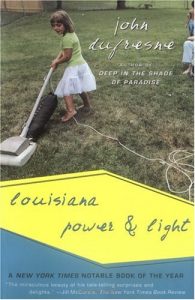 I’m in a book club. Well, that’s not entirely accurate. As with all book clubs above a certain mayfly-like age, it has died an inglorious death, somewhere in the middle of the first book.[1] But I can say with pride that I did not contribute to that death. Yay! The book selected was one of those modern fictions in the sense that it was published since the middle of the last century and doesn’t have a particular sub-genre, but not in the sense that it was designed solely to fill me with rage. Which does make it rather a stand-out, and I’m glad someone put me onto it!
I’m in a book club. Well, that’s not entirely accurate. As with all book clubs above a certain mayfly-like age, it has died an inglorious death, somewhere in the middle of the first book.[1] But I can say with pride that I did not contribute to that death. Yay! The book selected was one of those modern fictions in the sense that it was published since the middle of the last century and doesn’t have a particular sub-genre, but not in the sense that it was designed solely to fill me with rage. Which does make it rather a stand-out, and I’m glad someone put me onto it!
Unfortunately, the lack of genre convention makes it hard for me to describe Louisiana Power & Light without jumping right into spoiler territory. But I can at least minimize, one supposes. In 1970s small-town Louisiana, everyone is in everyone else’s business; in that sense, it reminds me a lot of some of Stephen King’s work, except with thoroughly Southern rather than Yankee sensibilities. The focal point of everyone’s attention for the previous century, though, has been the Fontana family, who all but literally crawled out of the swamp decades ago and have since brought forth a multitude of only male children who have, one by one, been brought down by tragicomic fates; in short, the very stuff of which local legends are made. But now, orphaned Billy Wayne Fontana, being raised by nuns who are grooming him for a life in the seminary, is the only one left.
And, that, ultimately, is what the whole book is about. The town has a collective narration, and that collective is primarily concerned with Billy Wayne’s outcome and offspring. It shifts rapidly between sympathetic and judgmental, ready for the Fontanas to finally stop blighting the locality with misery and failure at every moment and yet gleefully ready to recount hundreds of stories about minor setbacks and major tragedies wrought by his family’s history. And certainly the individual characters are equally concerned with his ultimate fate, though in different and often kinder ways. Untangling the motivations of the collective narrator and sifting fact from wishful thinking is a delight, though I admittedly always groove on untrustworthy narration, and the uniquely Southern digressions are one of the few things I miss in my mostly genre-fiction bookshelves. It’s just, people here really do talk and act like this, even at the very edge of the South, and it always amuses me to see someone capture it. But the very best parts of the book are the moments when Billy Wayne Fontana (and especially his younger son, who I deem not a spoiler since he’s mentioned pre-emptively in the prologue) notices and tries to act upon his own fate, instead of just floating like a ragdoll toward the inevitable thunderous waterfall just around the bend; because when that happens, the narrator is finally at a loss and we get brief glimpses of what the Fontanas really are. Legends have their place, but a dose of truth makes the legend that much sweeter, I figure.
[1] I acknowledge that many book clubs make it as far as the middle of the second book.